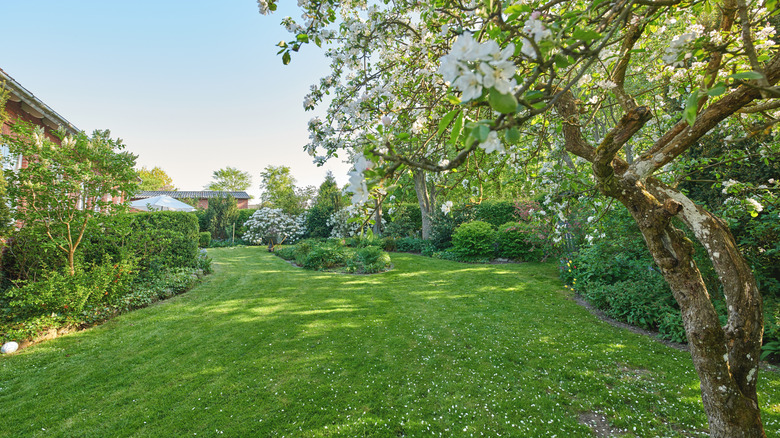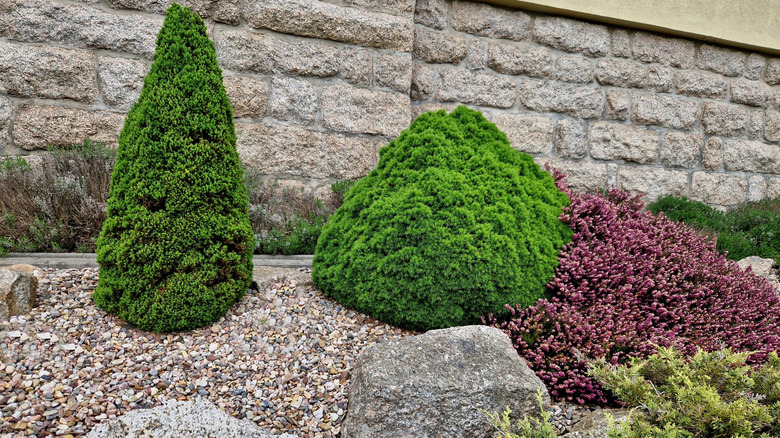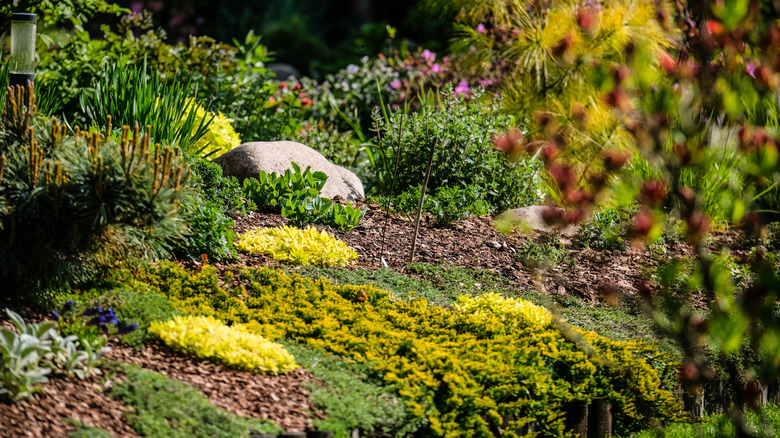The Landscaping Mistake In Hot Climates That Is Hurting Your Plant's Health
We all need to do what we can to keep cool at home during the summer. Indoors, that might mean sealing up gaps, keeping your AC maintained, and closing blinds to keep sunlight out. Outdoors, that includes making wise choices when landscaping our gardens and yards — sustainable options include growing shade trees and ditching grassy lawns for alternatives that don't require lots of mowing. But some homeowners may mistakenly overlook another landscaping element that's contributing to a warmer yard — rock mulch. It takes a hot situation and makes it even hotter.
Rock mulch can create stylish-looking beds or borders that conjure up a minimalist aesthetic; although to keep these stone-filled areas looking crisp and fresh requires more upkeep than many gardeners anticipate. Maintenance concerns may be laughable, though, when the real concern is sweltering conditions. Using rocks as mulch is one of many mistakes beginning gardeners in a hot climate will want to avoid since this landscaping choice can cause heat stress in plants.
Why rock mulch causes heat stress in plants
Rock mulch is quite attractive when used to cover the soil around conifers, bunch grasses, or succulents. But no matter how good it looks, a problem is lurking — rocks absorb and radiate heat, raising the temperature of the air around them. Stones also heat the soil under them significantly compared to an organic option like shredded bark, which can keep the soil cool and moist.
Of course, there are benefits to this landscaping choice as well, since an increase in temperature can be beneficial during cold weather. Let's also acknowledge that there are plants that grow among rocks in nature, and those plants are adapted to the heat-radiating properties of stones and pebbles. But unless a plant is specifically recommended for rock gardens, stone mulch may be a big mistake.
When conditions become too hot during summer, this can lead to weakened or dead plants. The rocks can overheat the plants and their roots, causing stress. The heat also contributes to moisture loss, which can rob your plants of the water they need. Your garden also misses out on the nutrients that come from decomposing organic compost. These factors may inspire you to seek out alternatives to rock mulch.
Alternatives to rock mulch for landscaping
Using the wrong type of material to cover the soil around plants is a common mulching mistake, and the motivation for a cooler yard may drive gardeners to explore alternatives, particularly when exploring soil covering options for a new landscaping project. Unlike inorganic options like rock, organic materials that are used as soil coverings help to cool things off, and they also gradually break down, adding nutrients and organic matter to the soil.
Shredded bark helps create a more moderate temperature for plants, in both the summer and the winter. Leaf mulch is another option and an economical one, since gardeners can use fallen leaves from the trees in their yards. And for those hoping to add a wildlife habitat to their landscaping plans, the best type of mulch for your garden may be a living mulch, which can be pollinator friendly in addition to helping to keep things cooler. Living mulch is created with low-growing plants — it's a type of ground cover that suppresses weeds, retains moisture, and regulates temperatures in the area.


